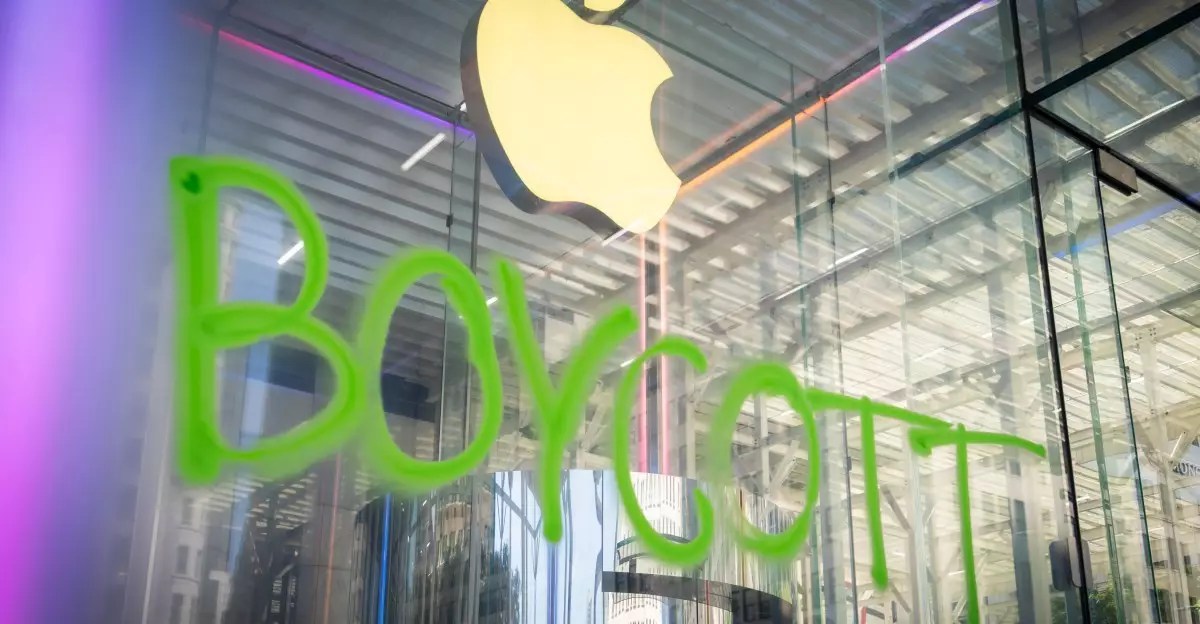In recent years, the discourse surrounding corporate responsibility has become increasingly complex. Major technology firms, often lauded for their innovative solutions and forward-thinking images, have cultivated a perception of environmental stewardship. Yet, beneath this veneer of sustainability lies an uncomfortable truth—many of these companies are actively complicit in perpetuating climate degradation. The recent protest at Apple’s Fifth Avenue storefront, where activists spray-painted provocations such as “Tim + Trump = Toxic,” underscores this stark disconnect. The act was not merely about vandalism; it was a vehement indictment of a corporation that talks a good game but, in many ways, acts counter to its professed values.
The focus on Apple’s CEO, Tim Cook, and his association with political figures like Donald Trump highlights a broader pattern of corporate hypocrisy. Apple, which proclaims to support climate initiatives, has also been implicated in lobbying efforts and political donations that undermine environmental progress. The protesters rightly challenge the narrative that these tech giants are environmental champions when, in reality, their actions often contradict their words. At a time when climate urgency demands authentic leadership, companies like Apple hide behind sustainability claims while continuing to support policies and administrations that actively weaken environmental protections.
The Contradiction Between Corporate Messaging and Real Impact
The protest’s powerful message—labeling the Trump administration as “Toxic”—aims to spotlight the gap between corporate rhetoric and politically motivated actions. Many of these companies publicly pledge to reduce carbon footprints and embrace sustainable practices, yet their political contributions and lobbying efforts frequently oppose or undermine these commitments. For instance, Apple’s support for politicians who back fossil fuel initiatives directly conflicts with their stated environmental goals. This contradiction exposes a fundamental flaw: corporate social responsibility is often relegated to marketing strategies rather than genuine policy advocacy.
Furthermore, the protest addressed the energy used in AI and data centers, posting a sobering reminder that technological advancement is not without environmental toll. Google’s rising emissions and Microsoft’s increased energy consumption through AI investments highlight a troubling trend—beyond the rhetoric, the tech industry’s own growth threatens to undo the climate progress it claims to champion. The narrative of progress and innovation is co-opted to justify continued fossil fuel reliance and energy-intensive operations, revealing a fallacy that sustainable growth is inherently compatible with unchecked technological expansion.
Are We Victims of Manipulation or Willful Ignorance?
The larger question is whether these corporations are victims of systemic pressures or if they are willful participants in ecological neglect. The recent protests serve as a stark reminder of how corporate accountability often remains superficial until public outrage forces a reaction. Apple’s “climate commitments” seem hollow when scrutinized against the company’s political engagements and lobbying efforts in support of policies detrimental to the environment.
This discrepancy also indicates a troubling complacency within corporate culture—an unwillingness to confront the difficult truths about the environmental costs of their business models. As consumers become more aware and activist movements grow bolder, these companies can no longer rely solely on their branding to shield them from accountability. It’s crucial for the public to demand transparency, pushing these corporations beyond empty promises and towards tangible, verifiable climate action rooted in integrity.
Challenging the Status Quo: From Greenwashing to Genuine Change
The confrontation at Apple’s store is emblematic of a broader societal push to hold big tech accountable. Activists like Extinction Rebellion understand that symbolic protests alone are insufficient—they aim to spotlight systemic issues and catalyze real change. Companies must recognize that public trust hinges on authentic engagement, not just superficial commitments. The role of public pressure becomes indispensable in driving policy shifts and making corporations reevaluate their priorities.
Moreover, this movement must extend beyond protests. Corporate accountability requires rigorous regulation, transparent reporting, and a willingness to overhaul business practices that harm the planet. It is time for consumers and policymakers alike to demand that these companies align their actions with their rhetoric. Only then can we bridge the chasm between corporate image and environmental reality, transforming the tech sector from a climate antagonist into a genuine leader in sustainability.


Leave a Reply